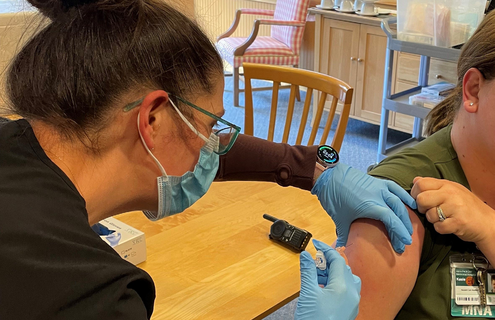
APD held employee and volunteer flu vaccinations for a week in September and will host another week in October. When you are working in healthcare seeing patients in person every day, a flu vaccination is key to keeping the community safe.
“Alice Peck Day Memorial Hospital recognize the morbidity and mortality associated with seasonal influenza and seeks to minimize the risk of exposure to this vaccine-preventable illness,” said Kirsten Eastman, OTR/L, Manager, Rehab and Occupational Health Services and member of the APD Flu Vaccination Committee. “We are committed to providing a safe and healthy environment for patients, residents, visitors, and staff.”
As flu season approaches, fall is a great time for anyone to get a flu vaccination. APD experts share why.
Who should get a flu vaccine?
People at high risk for the flu include adults age 65 and older, children younger than 5 years old, pregnant women and women up to two weeks after the end of pregnancy, American Indians, and Alaska Natives.
“Other health factors — such as chronic lung disease, diabetes, and heart disease — are known to increase a person’s risk of serious complications from the flu,” said John Thibodeau Jr., BSN, RN, Clinical Manager of Orthopedics, Surgical Specialties, Medical infusion, and Occupational Health Services and member of the APD Flu Vaccination Committee.
When is the best time to get a flu vaccine?
Influenza viruses spread year-round, with activity peaking between December and February. Some folks like to get their flu shot right away to start building up immunity, while others may wait until later in the season to make sure they don’t catch the flu on Valentine’s Day. According to the CDC, any time in September or October is a good time to get your flu vaccine.
Do I really need a flu shot every year?
The virus changes every year. Based on research of which flu viruses are most likely to spread and cause illness, the composition of flu vaccines are updated annually. This year, according to the CDC, all current U.S. flu vaccines protect against a flu A(H1) virus, a flu A(H3) virus, a flu B/Yamagata lineage virus, and a flu B/Victoria lineage virus.
“Last year’s vaccine may have created antibodies that could help you this year, but the virus will have changed. An annual flu vaccine can keep you from getting the flu, make you less sick if you do get the flu, and keep you from spreading the flu to others...which everyone appreciates,” Thibodeau said.
How well do flu vaccines work?
Studies indicate the flu vaccine reduces the risk of doctor visits due to the flu by approximately 50 to 60% among the overall population. It does not guarantee protection against the flu, but if you do get sick your illness may be milder.
Is it safe to receive the flu and COVID vaccines?
Yes. According to the Centers for Disease Control, it is safe to receive both vaccines. You can even get them on the same day and during the same appointment. Receiving both does not change the effectiveness of either vaccine or cause more side effects.
Does the flu vaccine give you the flu?
The flu vaccine doesn’t give you the flu because it does not contain a live virus. If you feel off, it means your immune system is responding to the vaccine and that feeling usually goes away within 24 hours. A small percentage of people may experience a sore shoulder or mild muscle aches near where they received their vaccination.
Learn more about flu vaccination at www.cdc.gov/flu